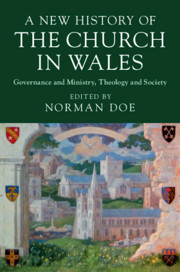Book contents
- Reviews
- A New History of the Church in Wales
- A New History of the Church in Wales
- Copyright page
- Contents
- Plates
- Contributors
- Foreword
- Editorial Preface
- Introduction
- Part I Historical Antecedents and Overview of the Century
- Part II Governance and Ministry
- Part III Doctrine, Liturgy, Rites and Other Faith Communities
- 9 The Doctrine of the Church
- 10 The Liturgy of the Church
- 11 The Rites of Passage
- 12 The Church and Other Communities of Faith
- Part IV The Church and Society
- Part V Conclusions
- Bibliography
- Index
- Plate Section (PDF Only)
11 - The Rites of Passage
from Part III - Doctrine, Liturgy, Rites and Other Faith Communities
Published online by Cambridge University Press: 22 February 2020
- Reviews
- A New History of the Church in Wales
- A New History of the Church in Wales
- Copyright page
- Contents
- Plates
- Contributors
- Foreword
- Editorial Preface
- Introduction
- Part I Historical Antecedents and Overview of the Century
- Part II Governance and Ministry
- Part III Doctrine, Liturgy, Rites and Other Faith Communities
- 9 The Doctrine of the Church
- 10 The Liturgy of the Church
- 11 The Rites of Passage
- 12 The Church and Other Communities of Faith
- Part IV The Church and Society
- Part V Conclusions
- Bibliography
- Index
- Plate Section (PDF Only)
Summary
The so-called rites of passage - baptism, confirmation, Holy Communion, marriage, and burial - are rarely addressed in the Constitution of the Church in Wales. Norms are found in liturgical rubrics and other regulatory forms in the service books, in soft-law, and in pre-1920 ecclesiastical law which continues to apply to the Church in Wales unless and until altered by it. Baptism, confirmation and Holy Communion are not governed by State law. But the civil law on marriage and burial continues to apply to the church as vestiges of the old establishment. Over the century, there have been several key changes in ritual norms. In some respects, the church is progressive when compared with other Anglican churches. Changes to burial norms in the 1970s removed the traditional prohibitions on those who die unbaptised, excommunicate or who commit suicide. The Church in Wales is only the fourth Anglican church to admit to Holy Communion all those who have been baptised. Moreover, there are proposed changes afoot in relation to solemnising same-sex marriages. However, the way in which these changes have been implemented has, in some respects, led to a degree of uncertainty - and it remains to be seen what impact some of the changes (such as in the case of confirmation) will have on the rites in the future.
- Type
- Chapter
- Information
- A New History of the Church in WalesGovernance and Ministry, Theology and Society, pp. 198 - 214Publisher: Cambridge University PressPrint publication year: 2020

